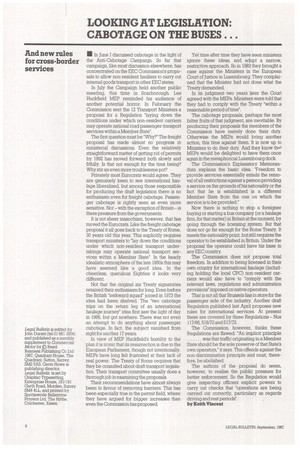LOOKING AT LEGISLATION: CABOTAGE ON THE BUSES . . .
Page 106

If you've noticed an error in this article please click here to report it so we can fix it.
• In June I discussed cabotage in the light of the Anti-Cabotage Campaign. So far that campaign, like most discussion elsewhere, has concentrated on the EEC Commission's proposals to allow non-resident hauliers to carry out internal goods transport in other EEC states.
In July the Campaign held another public meeting, this time in Scarborough. Les Huckfield MEP reminded his audience of another potential horror. In February the Commts,sion sent the 12 Transport Ministers a proposal for a Regulation "laying down the conditions under which non-resident carriers may operate national road passenger transport services within a Member State".
The first question must be "Why'?" The freight proposal has made almost no progress in ministerial discussions. Even the relatively straightforward matter of getting rid of permits by 1992 has moved forward both slowly and fitfully. Is that not enough for the time being? Why stir an even more troublesome pot?
Privately most Eurocrats would agree. They are genuinely keen to see international haulage liberalised, but among those responsible for producing the draft legislation there is no enthusiasm even for freight cabotage. Passenger cabotage is rightly seen as even more sensitive. Nor with the exception of Britain is there pressure from the governments.
It is not sheer masochism, however, that has moved the Eurocrats. Like the freight cabotage proposal it all goes back to the Treaty of Rome, 30 years old this year. This explicitly requires transport ministers to lay down the conditions under which non-resident transport undertakings may operate national transport services within a Member State". In the heady idealistic atmosphere of the late 1950s this may have seemed like a good idea. In the cheerless, querulous Eighties it looks very different.
Not that the original six Treaty signatories retained their enthusiasm for long. Even before the British "awkward squad" joined in 1973 the idea had been shelved. The "two cabotage trips on the return leg of an international haulage journey" idea first saw the light of day in 1966, but got nowhere. There was not even an attempt to do anything about passenger cabotage. In fact, the subject vanished from sight for another 17 years.
In view of MEP Huckfield's hostility to the plan it is ironic that its resurrection is due to the European Parliament, though not intentionally, MEPs have long felt frustrated at their lack of real power. The Treaty of Rome requires that they be consulted about draft transport legislation. Their transport committee usually does a thorough job in examining the proposals.
Their recommendations have almost always been in favour of removing barriers. This has been especially true in the permit field, where they have argued for bigger increases than even the Commission has proposed. Yet time after time they have seen ministers ignore these ideas, and adopt a narrow, restrictive approach. So in 1963 they brought a case against the Ministers in the European Court of Justice in Luxembourg. They complained that the Minister had not done what the Treaty demanded In its judgment two years later the Court agreed with the MEPs. Ministers were told that they had to comply with the Treaty "within a reasonable period of time".
The cabotage proposals, perhaps the most bitter fruits of that judgment, are inevitable. By producing their proposals the members of the Commission have merely done their duty. Otherwise the MEPs would bring another action, this time against them. It is now up to Ministers to do their duty. And they know that MEPs would be delighted to have them once again in the metaphorical Luxembourg dock, The Commission's Explanatory Memorandum explains the basic idea. "Freedom to provide services essentially entails the removal of all restrictions against a person providing a service on the grounds of his nationality or the fact that he is established in a different Member State from the one on which the service is to be provided" Now there is nothing to stop a foreigner buying or starting a bus company (or a haulage firm, for that matter) in Britain at the moment, by going through the licensing system. But that does not go far enough for the Rome Treaty. It meets the nationality point, but still requires the operator to be established in Britain. Under the proposal the operator could have his base in any EEC country.
The Commission does not propose total freedom. In addition to being licensed in their own cduntry for international haulage (including holding the local CPC) non-resident carriers would also have to 'comply with the relevant laws, regulations and administration provisions" imposed on native operators.
That is not all that Brussels has in store for the passenger side of the industry. Another draft Regulation published last April proposes new rules for international services. At present these are covered by three Regulations Nos 117/66, 516/72 and 517/72.
The Commission, however, thinks these Regulations are flawed. "An implicit principle was that traffic originating in a Member State should be the sole preserve of that State's own operators," it says. This offends against the non-discrimination principle and must, therefore, be abolished.
The authors of the proposal do seem, however, to realise the public pressure for better enforcement. So the Regulation would give inspecting officers explicit powers to carry out checks that "operations are being carried out correctly, particulary as regards driving and rest periods".
by Keith Vincent












































































































